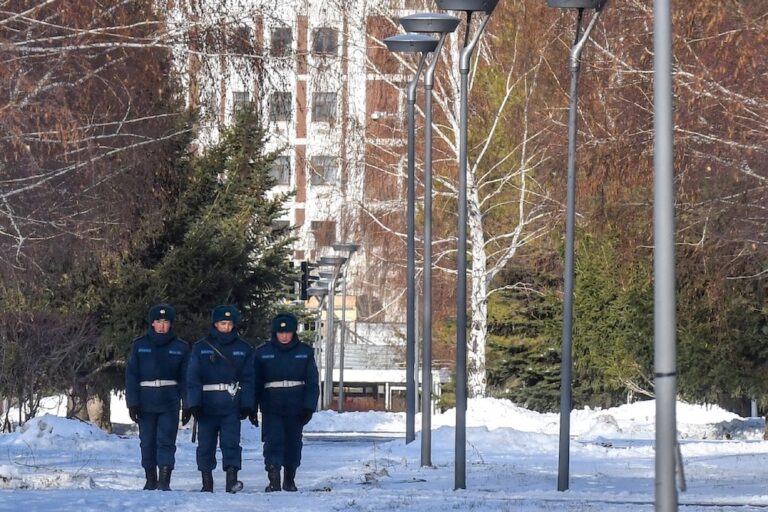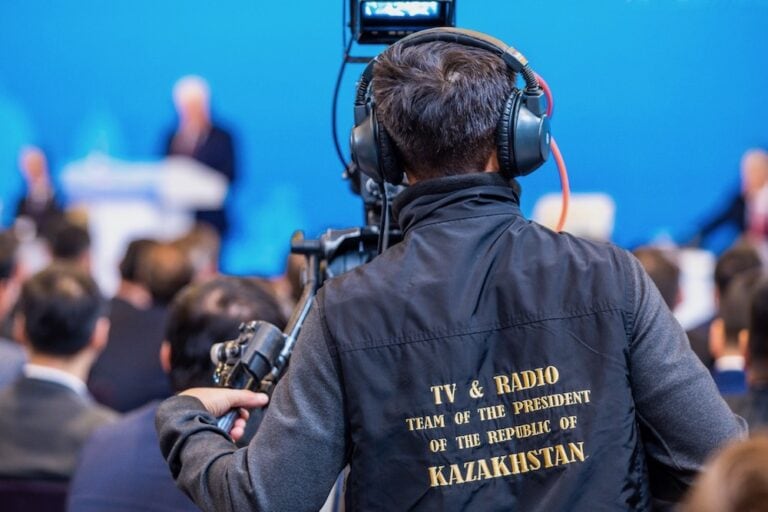Police arrested Ermek Narymbaev, a civic activist, and Serikzhan Mambetalin, former head of the Rukhaniyat party, on October 12, after receiving information that “they had circulated material on social media that contains clear signs of inciting national discord [and] insulting national honor and dignity,” according to a police statement.
This statement was originally published on hrw.org on 16 October 2015.
Kazakhstan officials have arrested two activists while investigating them on vague and overbroad charges of “inciting national discord,” Human Rights Watch said today. An Almaty court confirmed a two-month pretrial detention order on October 15, 2015.
Police arrested Ermek Narymbaev, a civic activist, and Serikzhan Mambetalin, former head of the Rukhaniyat party, on October 12, after receiving information that “they had circulated material on social media that contains clear signs of inciting national discord [and] insulting national honor and dignity,” according to a police statement. Kazakh authorities should release them immediately.
“By arresting Narymbaev and Mambetalin, the police seem more interested in muzzling government critics than in combating actual criminal activity,” said Mihra Rittmann, Europe and Central Asia researcher at Human Rights Watch. “The police should pursue concrete evidence of any crime that has been committed, but they should release Narymbaev and Mambetalin at once.”
Both Narymbaev and Mambetalin are critical of the government and are quite active on social media networks. Both have previously found themselves in government crosshairs for peaceful civic activity. Authorities jailed Narymbaev twice this year for up to 20 days after he attempted to stage peaceful protests. In late 2011, Mambetalin’s party was prevented from participating in 2012 parliamentary elections due to alleged irregularities in its party list.
Under Article 174, part 2 of the criminal code, the men could face up to 10 years in prison for “inciting social, national, clan, racial, class, or religious discord.”
The charges appear to be connected to Narymbaev and Mambetalin’s recent Facebook posts about writings attributed to another activist, Murat Telibekov.
Telibekov is the author of a collection of poems and plays that he tried – unsuccessfully – to publish about 20 years ago. Recently, texts that were attributed to Telibekov’s book, but that he said he did not write, were posted on the Web. These additional texts, which describe the Kazakh nation in provocative terms, were the subject of Narymbaev’s and Mambetalin’s Facebook posts.
On October 12, about a dozen police officers detained Narymbaev and searched his office and home, confiscating laptops and modems. The police did not permit Zhanara Balgabaeva, Narymbaev’s lawyer, who arrived at his office after the search began, to enter during the search, although she was present during the search of her client’s home.
The same day, another group of police officers detained Mambetalin at his home and searched the premises. A family member who was there told Human Rights Watch that the police read the search warrant aloud but did not provide a copy. The police confiscated Mambetalin’s computer, tablet, and mobile phone.
Both Balgabaeva and Mambetalin’s lawyer, Ermurat Mukanov, told Human Rights Watch that they will appeal the court’s decision to place the activists in custody during the investigation period.
“Kazakh authorities have a sorry record of using the vague and overbroad charge of inciting national discord to curtail free speech,” Rittmann said. “The authorities should put an immediate end to misusing the criminal code to silence outspoken critics.”
Human Rights Watch and others, including the United Nations Special Rapporteur on the rights to freedom of peaceful assembly and of association after his visit to Kazakhstan this year, have called on the Kazakh government to amend the charge of “inciting social, national, clan, racial, class, or religious discord” so that it is strictly and narrowly defined.
In 2014, the Kazakh government broadened the scope of the offense, increasing maximum sentences from 12 years in prison to 20, showing blatant disregard for its obligations under international human rights law.
The offense is so vague and overbroad that it can be, and has been, used to criminalize lawful behavior protected by human rights law. Freedom of opinion, expression, and association are basic rights protected by international treaties to which Kazakhstan is party and should not be violated, Human Rights Watch said.
On October 13, another activist, Bakhytzhan Toregozhena, received an official notice from the prosecutor’s office reminding her that “inciting national discord” is a criminal offense and warning against “committing any acts that call on citizens to circulate information found to contain traces of inciting national discord, insulting citizens’ honor and dignity.”
Earlier that day, Toregozhena had put up a post on Facebook urging those who support Narymbaev and Mambetalin to post excerpts from Telibekov’s book.
In April, police opened a separate investigation implicating Telibekov on the same charges, after an expert linguistic analysis they had ordered found that the text attributed to Telibekov’s book contained elements of “inciting national discord.”
Telibekov told Human Rights Watch that he did not write the excerpts in question and that they were not included in his original book. He denies having anything to do with posting the book online.
Kazakhstan’s international partners, including the United States, the United Kingdom, and European Union member states, should urge the Kazakh government to amend the offense of “inciting social and other discord” without further delay, Human Rights Watch said.
“People in Kazakhstan should be free to debate matters of public interest online and not be worried that they’ll land up in jail for expressing an opinion,” Rittmann said.


